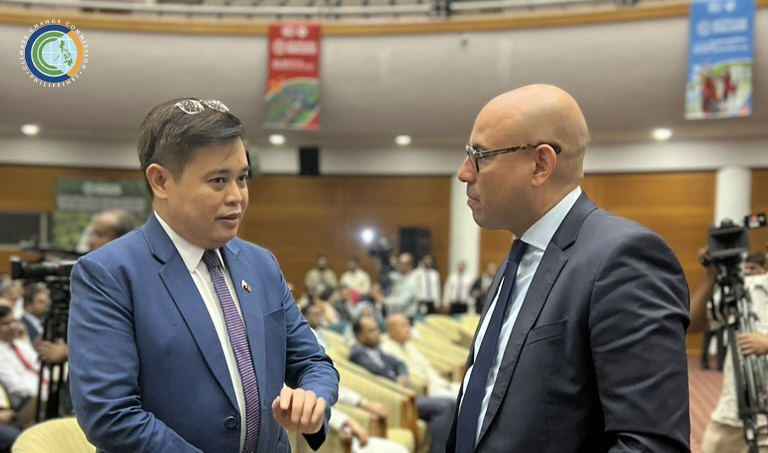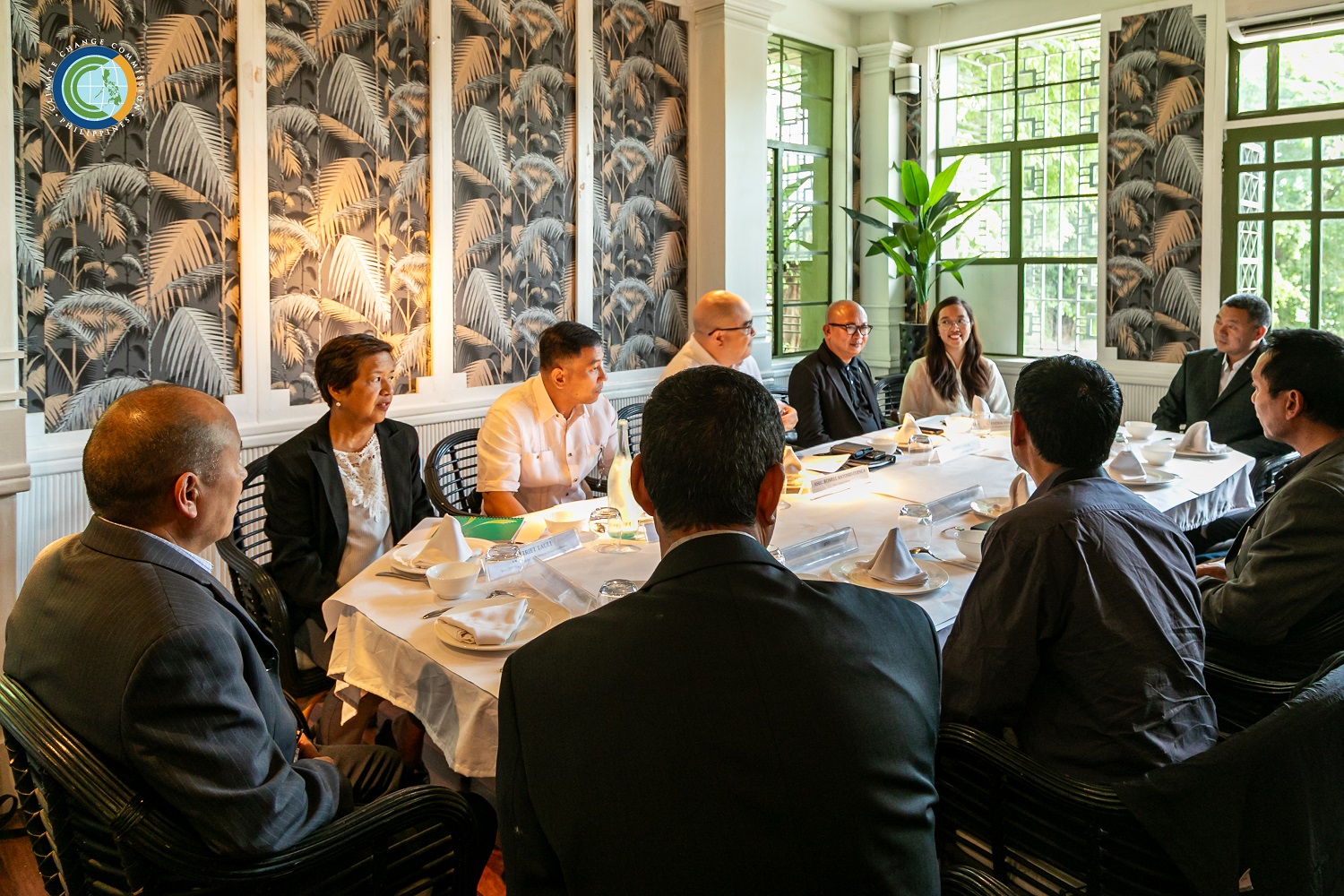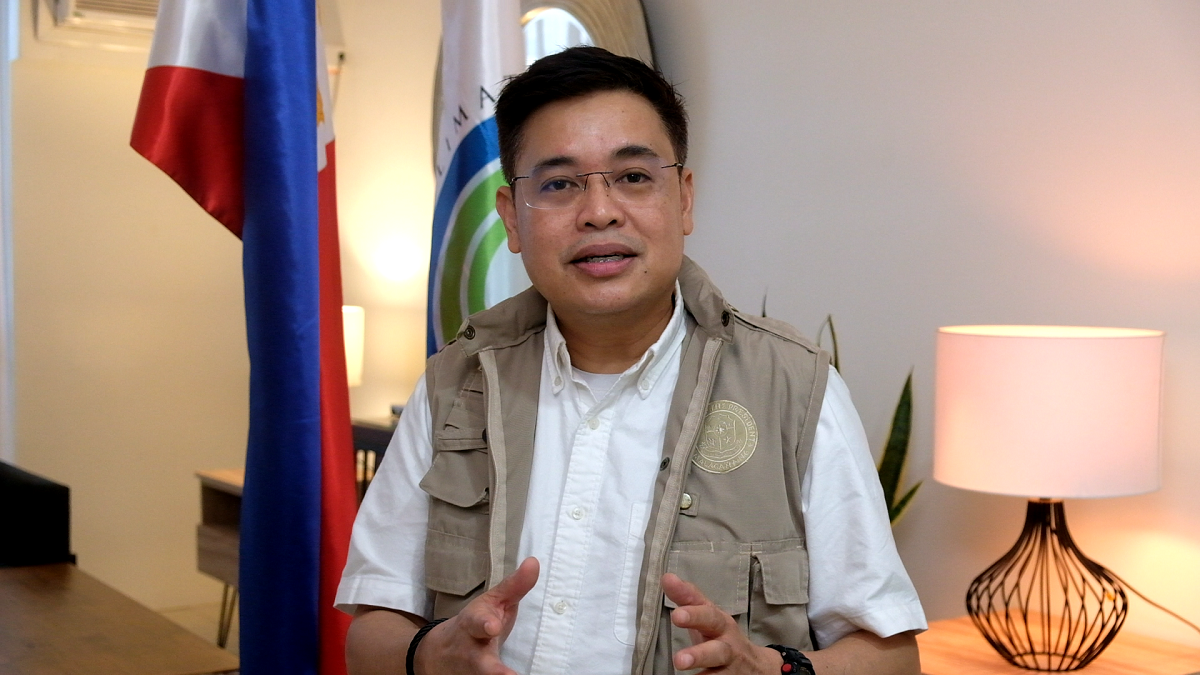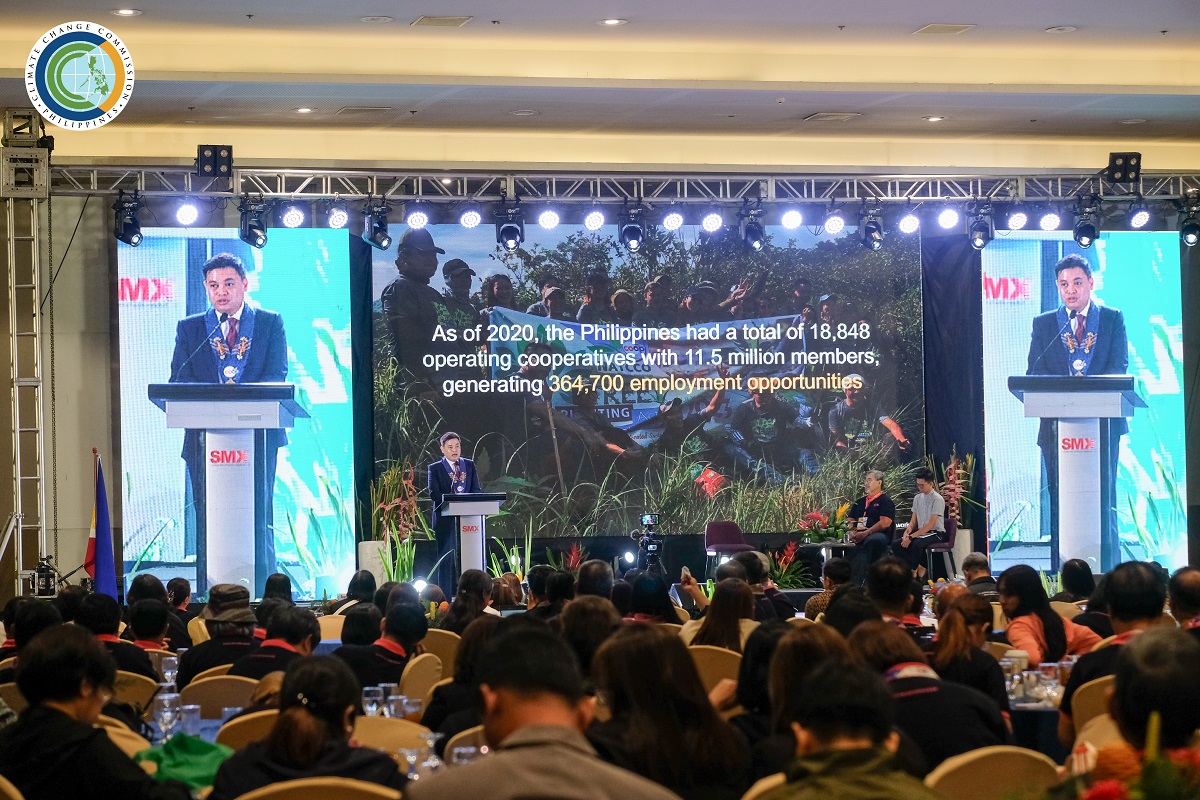
CCC urges closing adaptation finance gaps for transformative climate action
May 10, 2024 Friday
Dhaka, Bangladesh. Recognizing that finance and investments are crucial for implementing transformative climate actions, the Philippines called for the immediate delivery of climate finance commitments and underscored the need to close adaptation finance gaps, including through exploring innovative sources, to support developing nations’ adaptation measures.
The importance of National Adaptation Plans (NAPs) for developing nations most at-risk to and affected by climate change was emphasized at the NAP Expo 2024. A high-level transformational dialogue was held to unlock diverse sources of adaptation finance.
Climate Change Commission (CCC) Secretary Robert E.A. Borje joined the dialogue, together with United Nations Framework Convention on Climate Change (UNFCCC) Executive Secretary Simon Stiell, and Bangladesh Minister for Environment, Forestry and Climate Change Saber Hossain Chowdhury.
Borje underscored the importance of holistic approach to close adaptation finance gaps, ensuring that support for developing countries’ NAP formulation and implementation is available and easily accessible.
“To close the gaps, address our growing needs, and enhance adaptation action and support, we must work collectively to determine and unlock various sources, including the UNFCCC financial mechanism, and finance options with highest concessionality, least to no conditionalities, and no additional debt burden for developing nations,” Borje said.
The UN Environment Programme’s Adaptation Gap Report 2023 estimated that support for adaptation falls short by up to USD 366 billion per year. Public finance flows for climate change adaptation from developed to developing countries have declined by 15 percent from 2021 figures, signaling the need to explore other sources for timely implementation of adaptation measures.
“We need to go beyond the doubling of adaptation finance by 2025, and delivering on the overdue commitment of USD 100 billion for developing countries’ climate actions,” Borje emphasized. “We need to be more creative and innovative to enable our timely implementation of action plans – so that we avoid further loss and damage, while building our adaptive capacities.”
Guided by President Ferdinand R. Marcos, Jr., the Philippines forges partnerships with various countries, partners and stakeholders to augment domestic resources, enabling implementation of climate actions in speed and scale.
In addition to the UNFCCC financial mechanism including the Green Climate Fund (GCF), Borje highlighted other innovative sources of support applicable to the Philippines, such as bilateral partnerships, private sector investments, foreign-assisted support from development partners and stakeholders, and mechanisms such as thematic bonds.
From formulation to implementation, Borje underscored the importance of climate finance throughout the iterative process of NAPs.
“NAPs should then be considered as investment plans. With sufficient finance and transparent and predictable support flows, developing nations can translate plans into concrete actions with results,” Borje added.
Discussions on closing adaptation finance gaps and determining the new collective quantified goal on climate finance are expected to progress at the 29th Session of the Conference of Parties (COP29).
Hosted by the UNFCCC through the Least Developed Countries (LDC) Expert Group or LEG, in collaboration with the Adaptation Committee (AC) and other constituted bodies, the NAP Expo 2024 was held from 22-25 April 2024 in Dhaka, Bangladesh.
Outcomes of the NAP Expo 2024 will be further discussed in the upcoming Climate Change Conference in June 2024 in Bonn, Germany, and COP29 in November 2024 in Baku, Azerbaijan.

PH highlights importance of NAPs as roadmap to resilience
May 09, 2024 Thursday
Dhaka, Bangladesh. The Philippines emphasized the importance of developing and implementing National Adaptation Plans (NAPs), and accelerating the provision and mobilization of support for developing nations to enable countries to outline their roadmaps towards climate resilience.
The ninth NAP Expo, hosted by the UN Convention on Climate Change (UNFCCC), in Dhaka, Bangladesh, centered on the theme "Driving Transformational Adaptation through National Adaptation Plans."
Bangladesh Prime Minister, H.E. Sheikh Hasina, urged nations to prioritize their policies and programs enhancing their adaptive capacities. Hasina also inaugurated the “Bangladesh Climate Development Partnership” to bolster cooperation with international partners in advancing their climate agenda.
CCC Secretary Robert E.A. Borje, serving as member of the UNFCCC’s Adaptation Committee attended the opening ceremony, joining UNFCCC Executive Secretary Simon Stiell and Adaptation Director Youseff Nasseff.
He echoed Hasina's sentiments, stressing NAPs' significance for developing countries. Borje emphasized that NAPs, based on local risks and priorities, serve as crucial roadmaps to resilience, safeguarding lives and livelihoods amidst worsening climate change.
“Country-driven, science- and evidence-based NAPs will assist developing countries in addressing climate change and its impacts. With the assessment of local risks and vulnerabilities, and priority climate actions, NAP serves as our roadmap to resilience – a plan that can save our lives and livelihoods, and protect our future amidst worsening climate change,” Borje said.
The Philippines shared its NAP formulation journey during various sessions, discussing best practices, lessons learned, and challenges. Borje underscored the need to view NAPs as investment plans during high-level dialogues, advocating for support to facilitate NAP formulation for developing nations.
Hosted by the UNFCCC through the Least Developed Countries (LDC) Expert Group or LEG, in collaboration with the Adaptation Committee (AC) and other constituted bodies, the NAP Expo 2024 was held from 22-25 April 2024 in Dhaka, Bangladesh.
Appointed during the 28th Sessions of the Conference of Parties (COP28), Borje serves as a member of the AC representing developing nations. It is the first time a Filipino national was appointed in the 14-year history of the AC, developing policies and providing guidance on global adaptation actions.
Outcomes of the NAP Expo 2024 will be deliberated at the Bonn Climate Change Conference in June 2024 and reported at the Conference of Parties in November 2024, signaling ongoing international collaboration towards climate resilience.

CCC, Bhutan-based NGO explore collaboration on pro-climate practices
May 09, 2024 Thursday
CCC and Bhutan’s RSPN discuss pro-climate practices and explore potential opportunities for future collaboration during a lunch meeting.
MANILA, 9 May 2024 — Sharing insights and experiences, the Climate Change Commission (CCC) and Bhutan’s Royal Society for Protection of Nature (RSPN) engaged in a discussion, exchanging best practices, victories, and challenges in addressing the impacts of climate change and examining potential areas of collaboration.
During a meeting with RSPN, the CCC delegation, led by Deputy Executive Director Rommel Antonio O. Cuenca, delved into several key aspects of the nation’s climate change strategy. These include mainstreaming frameworks such as the National Framework Strategy on Climate Change, the National Climate Change Action Plan, and the development of the National Adaptation Plan.
He outlined the Philippine government’s process for accessing the Green Climate Fund, establishing the People’s Survival Fund, and building collaborative relationships with all stakeholders across all sectors.
Furthermore, Cuenca conveyed the country’s ongoing challenges in promoting climate resilience, emphasizing the difficulties in laymanizing and communicating climate change to the general public and improving compliance with Local Climate Change Action Plans, particularly in remote areas of the Philippine archipelago.
“Climate change affects the lives, livelihoods, and future of many Filipinos. Despite contributing only a small percent to the global emissions, the Philippines suffers much devastation from climate change effects. Hence, there is a need for us to take comprehensive action to address climate change, with a focus on adaptation,” stressed Cuenca.
Meanwhile, Mr. Dasho Phub Dorji, Chairperson of the Board of Directors of the RSPN, shared practical insights and experiences in pushing for climate mitigation and adaptation, sustainable development, and ecological education in Bhutan.
The Kingdom of Bhutan is currently the only country in the world that is carbon negative — a distinction reserved for countries capable of removing more carbon dioxide from the atmosphere than they emit.
“Despite this achievement, we still face many challenges, especially in managing climate-induced disasters like flooding and in stopping illegal human activities that exacerbate climate change such as deforestation,” Dorji said.
RSPN, a non-government organization, aims to raise awareness of climate change among Bhutanese people through education, advocacy and public participation in conservation efforts.
Through the continued dedication, both the CCC and RSPN seek to innovate strategies to mitigate climate change impacts through knowledge and practices sharing.
“Growing partnerships through cooperation continues to be needed to allow developing nations to learn and adapt to climate change and its impacts. We need to continue working together to ensure that we are empowered to adapt to and mitigate climate change impacts and safeguard the precious balance in our planet, ” said Vice Chairperson and Executive Director Robert E.A. Borje.
The CCC remains resolute in its commitment to achieving Sustainable Development Goal 13 - Climate Action and SDG 17 - Partnerships for Sustainable Development. The Commission continues to forge effective partnerships to advance the country’s progress toward achieving its climate goals and agendas.
For more information on the CCC’s climate mainstreaming activities, visit www.climate.gov.ph and www.facebook.com/CCCPhl.

CCC underscores role of responsible journalism in addressing climate crisis
May 08, 2024 Wednesday
CCC Vice Chairperson and Executive Director Robert E.A. Borje delivers a keynote message at the "Writing the Story of Our Generation" event, coinciding with World Press Freedom Day. The event underscores the critical role of journalism in shaping public understanding of climate change and driving positive ecological action.
MANILA, 8 May 2024 — The Climate Change Commission (CCC) highlighted the importance of informed and responsible journalism in the face of rapid ecological degradation and escalating climate crisis.
At the "Writing the Story of Our Generation," an online community hangout and story festival hosted by Climate Tracker Asia, the CCC commended the journalists for amplifying the voices of vulnerable sectors and communities affected by ecological injustices, thereby empowering individuals and communities to make informed decisions.
"In an era marked by these challenges, the role of journalism in promoting awareness and advocating for sustainable solutions cannot be overstated. You – journalists – have the power to discuss difficult issues, to tell the public the warning signs of a planet in distress. But these are also the stories that bring the reality of climate change into focus, urging us to act," CCC Vice Chairperson and Executive Director Robert E.A. Borje emphasized.
Climate change demands transformative action on a global scale, and journalism can play a crucial role in amplifying the urgency of the climate crisis and highlighting innovative solutions from around the world. Journalists serve as catalysts for positive change by showcasing renewable energy initiatives, conservation efforts, and community-led sustainability projects.
"In these uncertain times, we should go beyond acknowledging the existence of ecological challenges," Borje remarked. "We must cultivate a deep respect for the intricate web of life that sustains us all, helping to move everyone toward positive change and responsible stewardship of our planet."
Borje also stressed the need for stories that not only illuminate the problems but also highlight the solutions—the ingenuity of scientists, the passion of activists, and the resilience of communities. "We need stories that give hope, because hope drives action leading to positive change."
The CCC reaffirmed its commitment to press freedom, transparency, and accountability. Borje encouraged journalists to harness their storytelling power and use their platform to discuss difficult issues and bring the reality of climate change into focus.
"Together, let's commit to writing the story of our generation—a story where the voices of the most vulnerable are heard and valued, where we embrace our responsibility as stewards of the Earth, and where we envision a future that is better than today," Borje concluded.
World Press Freedom Day, observed on May 3rd, honors the principles of press freedom and underscores the importance of freedom of expression as a fundamental human right. This year’s theme, “A Press for the Planet: Journalism in the face of the environmental crisis” emphasizes the importance of accurate reporting, combating misinformation, and promoting a diverse and resilient media landscape.
For more information on the CCC’s climate mainstreaming activities, visit www.climate.gov.ph and www.facebook.com/CCCPhl.

CCC emphasizes role of Coops in sustainable development, climate resilience
May 08, 2024 Wednesday
CCC Vice Chairperson and Executive Director Robert E.A. Borje discusses the integral role of Coops in attaining the country’s sustainability and climate goals during the 47th General Assembly and 22nd Leader’s Congress of NATCCO.
DAVAO CITY, 8 May 2024 — The Climate Change Commission highlighted the integral function of cooperatives in ushering sustainable development and attaining effective climate action in the country during the 47th General Assembly and 22nd Leaders’ Congress of the National Confederation of Cooperatives (NATCCO) held recently.
Secretary Robert E.A. Borje, CCC Vice Chairperson and Executive Director, emphasized the vital role of cooperatives during the second plenary session titled “Green Growth and Climate Resilience as a Path for Sustainability.”
“Cooperatives embody the spirit of bayanihan where people come together to help one another, to share resources, and work towards a common goal. It is also a creative approach to supporting people who need help. Strengthening the resilience of cooperatives enhances the resilience of our people, thereby fortifying the resilience of our entire nation,” said Borje.
“Local energy cooperatives can promote renewable sources, such as solar and wind, reducing fossil fuel dependence through shared resources. Agricultural cooperatives, on the other hand, aid sustainable farming, lowering carbon footprints and enhancing biodiversity. Meanwhile, transportation cooperatives advocate eco-friendly travel, cutting emissions and congestion. All of these foster local production for a resilient Philippine economy,” he further explained.
During the discussion, Borje amplified the ongoing efforts of the national government to achieve climate resilience and sustainable development across all sectors. He detailed the country’s overarching development and climate plans and frameworks such as the National Framework on Climate Change (NFCC), National Climate Change Adaptation Plan (NCCAP), and the draft National Adaptation Plan (NAP).
Borje emphasized the importance of the NAP in assisting cooperatives in identifying their assets and financial risks amid disasters and climate challenges. He delved into how our climate frameworks can effectively facilitate cooperative efforts to promote eco-friendly goods, services, technologies and practices to help protect Philippine ecosystems and biodiversity.
Moreover, Borje also highlighted the importance of reducing energy, materials, and water consumption through highly efficient strategies, transitioning to a low-carbon economy, and mitigating long-term waste and pollution.
NATCCO was established to supervise the coordination and provision of training and educational services at the national level and serve as a support mechanism for promoting social justice and economic development. This year, NATCCO’s assembly is focused on the theme “Building Trust, Climate Resilience and Sustainable Futures: Happy Members of Secured Co-ops in an Integrated Network.”
The CCC remains steadfast in its commitment to mainstreaming a whole-of-government and whole-of-society approach in developing the country’s strategies and plans for the climate crisis.
By engaging and involving the public, private, and cooperatives, the CCC aims to foster ecological and sustainable practices across a range of industries and contribute to the attainment of a climate smart and climate resilient Philippines.
For more information on the CCC’s climate mainstreaming activities, visit www.climate.gov.ph and www.facebook.com/CCCPhl.